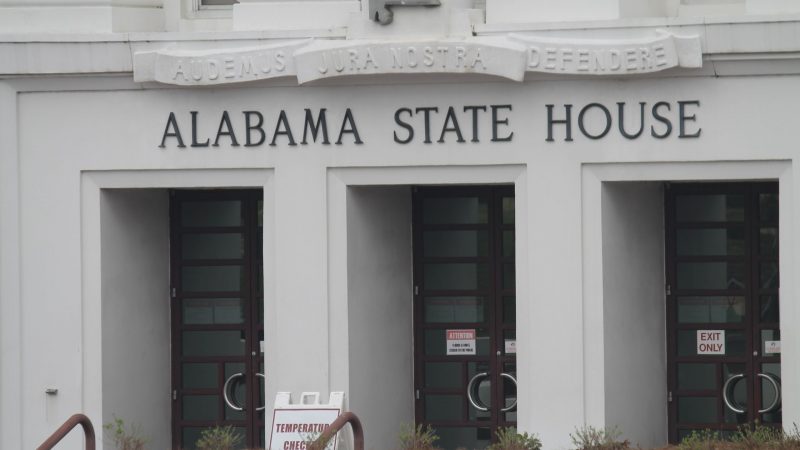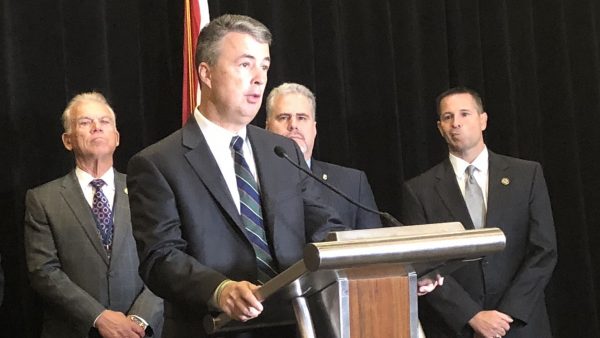50 Years After King’s Death, Birmingham Remembers
Dr. Martin Luther King Jr. led a civil rights movement that changed America. His assassination on April 4, 1968 set off deadly riots and protests in dozens of cities. Many African Americans in Birmingham were saddened and stunned in the hours following King’s death.
News that King had been assassinated while standing on the balcony of the Lorraine Motel in Memphis traveled fast in Birmingham. He was in Memphis to support striking sanitation workers. In Birmingham, King marched and was sent to jail for protesting the treatment of blacks in the city.
Bishop Calvin Woods is with the Southern Christian Leadership Conference, a civil rights organization founded by King. Woods was leading a meeting with preachers that night at St. Paul A.M.E. Church in Smithfield. He recalls civil rights activist Tommy Wrenn coming to the church, sitting next to him in the pulpit and telling him what had happened.
“We didn’t want to believe it. We almost became lost for words,” the 84-year-old Woods says. “Folk got up and went to walking out. We were certainly in agony.”
That agony gripped Birmingham. But Woods says ministers wanted to keep with King’s teachings on non-violence, even after his tragic death. They didn’t want the city to erupt in violence like other cities.
A few miles away on 24th Street South, the reaction was not as peaceful. Paulette Robey grew up in the Southtown Public Housing Community. White people traveling from downtown to Mountain Brook and other suburbs south of Birmingham had to drive through Southtown.
Robey describes how some black residents reacted after hearing of King’s death.
“They ganged up right there at Triangle Store, and we threw bottles, and we threw rocks and we threw milk bottles,” she says. Many in the group wanted to heed King’s message of non-violence. But she says, that night, they were upset and frustrated.
“It was like feeling a sensation that you got,” she says. “I guess, get back at them for what they was doing to us.”
Robey was arrested in the 1963 children’s marches. She attended rallies and mass meetings with her parents.
“I had had the experience of hearing him teach, and the feeling that I got within after I heard him speak,” she says. “I just knew everything was going to go downhill for the blacks because of his assassination. I just lost hope.”
Others, like 88-year-old Frank Dukes, were also rattled by King’s death. In 1962, Dukes, a minister, led a retail boycott to protest segregation. He was also one of several men who kept watch over King while he was in Birmingham.
“We had rifles and all of that to battle the Klan had they shown up to try to bomb the house or do anything to Dr. King,“ Dukes says.
If King was still alive today, Dukes says, King would think “that it’s a thousand times better than what it was. But he would also say that we still have a long way to go.”
Woods, Robey and Dukes say while there are more black elected officials today, there is still a lot to overcome when it comes to racial equality.
How food stamps could play a key role in fixing Jackson’s broken water system
JXN Water's affordability plan aims to raise much-needed revenue while offering discounts to customers in need, but it is currently tied up in court.
Alabama mine cited for federal safety violations since home explosion led to grandfather’s death, grandson’s injuries
Following a home explosion that killed one and critically injured another, residents want to know more about the mine under their community. So far, their questions have largely gone unanswered.
Crawfish prices are finally dropping, but farmers and fishers are still struggling
Last year’s devastating drought in Louisiana killed off large crops of crawfish, leading to a tough season for farmers, fishers and seafood lovers.
Lawmakers consider medical cannabis revamp
It’s been three years since Alabama lawmakers passed legislation establishing a system to govern medical cannabis in the state, yet not one prescription for the drug has been filled. The rollout has been delayed by lawsuits and conflict over the licensing process.
Man arrested in connection with device that exploded outside Alabama attorney general’s office
Kyle Benjamin Douglas Calvert, 26, of Irondale, Alabama, was arrested Wednesday on charges of malicious use of an explosive and possession of an unregistered destructive device, the U.S. attorney’s office said.
For some Gulf South schools, a March Madness loss can still be a win off the court
Making it into the NCAA Tournament can translate to boosts in student enrollment, athletic involvement, merchandise sales and more for participating schools.







